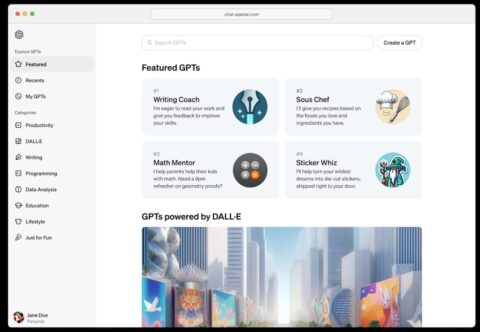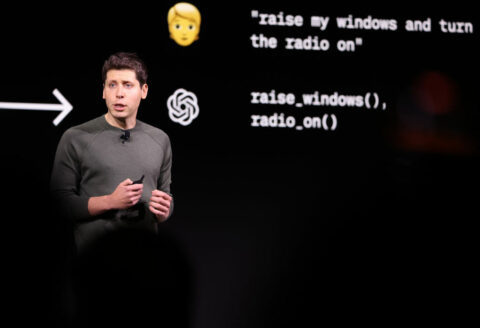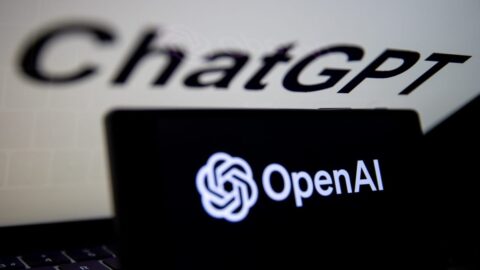After a raucous year of supposed breakthroughs in superconducting physics, 2023 is looking like it’s going to end with a whimper. This summer, LK-99 was the room-temperature superconductor […]
Everything announced at OpenAI’s first developer event
OpenAI held its first developer event on Monday and it was action-packed. The company launched improved models to new APIs. Here is a summary of all announcements in […]
GPT-4 Turbo and custom GPTs announced: What they are, how to try them
At OpenAI’s first developer conference, Sam Altman introduced GPT-4 Turbo with a slew of new features and updates.

With its new model GPT-4 Turbo, OpenAI continues to pave the way for AI-powered possibilities.
On Monday at OpenAI’s very first developer conference, CEO Sam Altman announced the release of the new model. It has a context window of 128,000 tokens, meaning it can process around 300 pages of text in a single prompt and incorporates vision, text-to-speech, and DALL-E 3. Plus, it’s about a third cheaper than GPT-4.
Even if you’re not a developer directly using the API, you can experience the improvements right away through ChatGPT and a new way of creating custom GPTs without coding knowledge. Here’s what to know about GPT-4 Turbo and how to access it.
GPT-4 Turbo on ChatGPT
With the superpowered large language model, ChatGPT will be more accurate and useful. First of all, the cutoff date for ChatGPT’s knowledge has finally been updated to April 2023. Next, OpenAI has done away with the option to toggle between different models — GPT 3.5, GPT 4, internet browsing, plugins, and DALL-E 3 — and will automatically detect what to use based on the purpose of your prompt, so the interface is simpler and more intuitive. These updates are available to ChatGPT Plus users.
OpenAI also announced a new initiative called Copyright Shield. For ChatGPT Enterprise and the developer platform, OpenAI will defend its customers and pay the costs incurred if they face any copyright infringement claims.
The knowledge cutoff date, elimination of the model picker tool, and Copyright Shield are all live today.
Custom GPTs
Nudging closer to its dream of AGI (artificial general intelligence), OpenAI launched a platform for users to develop their own custom versions of ChatGPT. If that sounds vaguely familiar, that’s because it’s an evolved version of ChatGPT plugins, but now with more capabilities.
Users can experiment with pre-existing custom GPTs like ones for creating your own designs on Canva or automating tasks with Zapier, or they can create their own chatbot without any coding knowledge. GPTs are designed to understand natural language, so all you need is an idea and some instructions to build your very own AI agent.
Later this month, OpenAI will launch a GPT Store, so users can create and browse custom GPTs, much like an app store. So yes, you’ll also be able to make money off your GPT.
ChatGPT Plus and Enterprise users can access example GPTs today, with access expanding to more users eventually.
OpenAI’s ChatGPT now has 100 million weekly active users
ChatGPT now has 100 million weekly active users, OpenAI CEO Sam Altman announced on Monday at the company’s first developer conference in San Francisco. The service released nearly […]
OpenAI launches DALL-E 3 API, new text-to-speech models
OpenAI launched a slew of new APIs during its first-ever developer day. DALL-E 3, OpenAI’s text-to-image model, is now available via an API after first coming to ChatGPT […]
A new breed of companies expand in San Francisco’s prime areas
Ten years ago, Pear VC, then a tiny new venture firm, operated out of a nondescript office in Palo Alto that was enlivened by bright, computer-themed art. Last […]
Musk says Twitter subscribers will get early access to xAI’s chatbot, Grok
Elon Musk’s AI startup, xAI, is creating its own version of ChatGPT. That appears to be the case, at least, from Musk’s tweets on X late Friday evening […]
OpenAI’s response to the AI executive order? Silence.
Many leading AI companies issued statements in response to President Biden’s executive order, but OpenAI has yet to say anything.

In the wake of President Biden’s executive order on Monday, AI companies and industry leaders have weighed in on this watershed moment in AI regulation. But the biggest player in the AI space, OpenAI, has been conspicuously quiet.
The Biden-Harris administration’s far-ranging executive order addressing the risks of AI builds upon voluntary commitments secured by 15 leading AI companies. OpenAI was among the first batch of companies to promise the White House safe, secure, and trustworthy development of its AI tools. Yet the company hasn’t issued any statement on its website or X (formerly known as Twitter). CEO Sam Altman, who regularly shares OpenAI news on X, hasn’t posted anything either.
OpenAI has not responded to Mashable’s request for comment.
Of the 15 companies that made a voluntary commitment to the Biden Administration, the following have made public statements, and all of which expressed support for the executive order: Adobe, Amazon, Anthropic, Google, IBM, Microsoft, Salesforce, and Scale AI. Nvidia decline to comment.
In addition to crickets from OpenAI, Mashable has yet to hear from Cohere, Inflection, Meta, Palantir, and Stability AI. But OpenAI and Altman’s publicity tour proclaiming the urgent risks of AI and the need for regulation makes the company’s silence all the more noticeable.
Altman has been vocal about the threat that generative AI made by his own company poses. In May, Altman, along with technology pioneers Geoffrey Hinton and Bill Gates signed an open letter, stating, “Mitigating the risk of extinction from AI should be a global priority alongside other societal-scale risks such as pandemics and nuclear war.”
At a senate hearing in May, Altman expressed the need for AI regulation: “I think if this technology goes wrong, it can go quite wrong, and we want to be vocal about that,” said Altman in response to inquiry from Sen. Blumenthal, D-CT about the threat of superhuman machine intelligence.
So far, cooperation with lawmakers and world leaders has worked in OpenAI’s favor. Altman participated in the Senate’s bipartisan closed-door AI summit, giving OpenAI a seat at the table for formulating AI legislation. Shortly after Altman’s testimony, leaked documents from OpenAI showed the company lobbying for weaker regulation in the European Union.
It’s unclear where OpenAI stands on the executive order, but open-source advocates say the company already has too much lobbying influence. On Wednesday, the same day as the AI Safety Summit in the U.K., more than 70 AI leaders issued a joint statement calling for a more transparent approach to AI regulation. “The idea that tight and proprietary control of foundational AI models is the only path to protecting us from society-scale harm is naive at best, dangerous at worst,” said the statement.
Meta Chief AI Scientist Yann LeCun, one of the signatories, doubled down on this sentiment on X (formerly known as Twitter) by calling out OpenAI, DeepMind (a subsidiary of Google), and Anthropic for using fear-mongering to ensure favorable outcomes. “[Sam] Altman, [Demis] Hassabis, and [Dario] Amodei are the ones doing massive corporate lobbying at the moment. They are the ones who are attempting to perform a regulatory capture of the AI industry,” he posted.
Anthropic and Google leadership have both provided statements supporting the executive order, leaving OpenAI the lone company accused of regulatory capture yet to issue any comment.
What could the executive order mean for OpenAI?
Many of the testing provisions in the EO relate to huge foundation models not yet on the market and future development of AI systems, suggesting consumer-facing tools like OpenAI’s ChatGPT won’t be impacted much.
“I don’t think we’re likely to see any immediate changes to any of the generative AI tools available to consumers,” said Jake Williams, former US National Security Agency (NSA) hacker and Faculty member at IANS Research. “OpenAI, Google, and others are definitely training foundation models and those are specifically called out in the EO if they might impact national security.”
So, whatever OpenAI is working on might be subjected to government testing.
In terms of how the executive order might impact directly OpenAI, Beth Simone Noveck, director of the Burnes Center for Social Change, said it could slow down the pace of new products and updates being released and companies will have to invest more in research and development and compliance.
“Companies developing large-scale language models (e.g. ChatGPT, Bard and those trained on billions of parameters of data) will be required to provide ongoing information to the federal government, including details of how they test their platforms,” said Noveck, who previously served as the first United States Deputy Chief Technology Officer under President Obama.
More than anything, the executive order signals an alignment with growing consumer expectations for greater control and protection of their personal data, said Avani Desai, CEO of Schellman, a top CPA firm that specializes in IT audit and cybersecurity.
“This is a huge win for privacy advocates as the transparency and data privacy measures can boost user confidence in AI-powered products and services,” Desai said.
So while the consequences of the executive order may not be immediate, it squarely applies to OpenAI’s tools and practices. You’d think OpenAI might have something to say about that.
A new generation of companies is moving on up in San Francisco
Up-and comers are taking over prime office space as a cycle begins anew; “I sold rugs for 17 years, so I have some skills in negotiation” Connie Loizos […]
Privacy will die to deliver us the thinking and knowing computer
We’re getting a a first proper look at much-hyped Humane’s “AI pin” (whatever that is) on November 9, and personalized AI memory startup Rewind is launching a pendant […]









